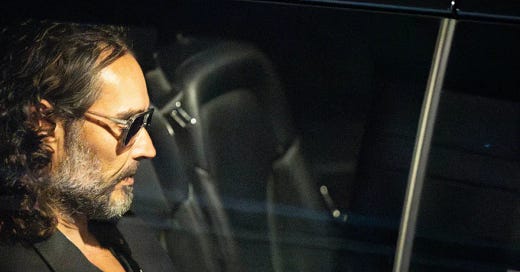Hi Russell,
I’ve been thinking about you a lot and reading the fusillade of articles, essays, and opinion pieces coming out about you from across a wide spectrum of opinion, as well as reviewing your first books, My Booky Wook 1 and 2. I have an idea for you that I do not think you will like, but I hope you will seriously consider it.
In what has happened, I believe, you have been given a great opportunity. For the last decade, you have claimed to walk the path of enlightenment and consciousness awakening. Here is your authentic opportunity to attain some of the enlightenment you say you want, and to help many people at the same time.
I see that your first efforts to address your public have been to deny, categorically, all accusations and allegations. You are trying to drive more of your audience (your “fans” or the “awakening wonders,” as you call them) to Rumble, where you feel you will be protected from further demonetization and can maintain some shred of your former wealth and prominence. You insinuate there is some kind of conspiracy underfoot. It seems you have been laying the groundwork for this moment by moving closer to the Alt Right / conspiracy worldview over the last years.
I am sure you know, in your heart, that these people you have courted who are now defending you are, more or less, terrible. I don’t think you want to spend the next decade having endless round-tables with Andrew Tate, Candace Owens, Tucker Carlson, Alex Jones, and the like. Even hell has nicer rooms than that.
This entire “strategy” is terrible — a sad swindle. You know this in your heart. You should abandon it. You can’t even try to prop up your old ego and personality structure anymore — you are realizing this, I am sure, in stages, and I know it must be terrifying. The best course of action is to detonate your past self: to surrender.
What you can do, instead, is make a confession of radical honesty and atonement. You can ask women you harmed in the past what you can do, at this point, to make amends. Because of your extraordinary reach, you can invite prominent women to help you and these women to find resolutions. And you can document what will be a cumbersome and painful process on your Youtube channel, including your own efforts to reach a new level of realization, which doesn’t happen all at once.
If you were to do this, it is possible (if unlikely) that you may go to prison for a bit, or you may have to forfeit some or even all of your wealth, if many women demand financial compensation through civil suits. Your wife may leave you and take the kids with her. All of that would be much better than living the rest of your life in a kind of phony, dissociated state, which is your other option at the moment.
If you were to take this path (which would be closer to the path of self-sacrifice modeled by spiritual teachers of the past including Jesus, who you often reference), you might do something of significant value for humanity.
At the moment, men and women are still trapped by the shadows of the past. We don’t know how to move forward, as a collective, from obsolete roles and ancient sorrows. Men can’t speak about their own subjective experience, without being labeled as monsters. The fact is, all human beings — men as well as women — are part monster, part animal, and part angel. We all make mistakes and commit, at least, “thought crimes.”
Thinking about your situation, I’ve been re-reading Warren Farrell’s books, The Myth of Male Power and Why Men Are the Way They Are. I definitely believe Farrell is onto something important. I find it astonishing there aren’t more, better efforts to unpack and understand male psychology and subjectivity from this perspective. Farrell shows how men do not actually have much freedom or power. He argues the world we live in is neither a patriarchy or a matriarchy: It has been shaped by men and women together, doing the best they could given particular historical circumstances. It is up to us to recognize this and work to change it.
Farrell notes, as men, we learn to deal with the fear and pain of rejection from an early age by objectifying women. Also, we are rewarded, as men, for risk-taking behavior, when it succeeds (when it doesn’t, men often end up ostracized or dead). You attained fame by pushing risk-taking in various areas, including your sexual pursuits, to the limit. This became part of your persona and your psychology. It perpetuated itself even when it became unhealthy and self-destructive.
I also think, combined with that, many artists possess an innate rebellious instinct. We know that something is horribly off — deeply hypocritical — about this society. When we gain prominence for acting out performatively against parts of it, we may feel more license to violate more of its taboos. This can include — particularly with male artists — taboos around sexual conduct, leading to “hypersexuality,” a kind of mania.
Normal people have all kinds of limits placed on their behavior. For someone like you, who attained superstardom in a culture that rewarded misogyny and certain forms of sexual misconduct with massive media attention and success, those limits get removed. The people around you became enablers, because it benefitted them or because they had to act that way if they wanted to keep their jobs. On your part, you became, it seems, drunk on your power, probably possessed by djinn, spirits, also (a longer discussion we might have at some point).
Keep reading with a 7-day free trial
Subscribe to Liminal News With Daniel Pinchbeck to keep reading this post and get 7 days of free access to the full post archives.





